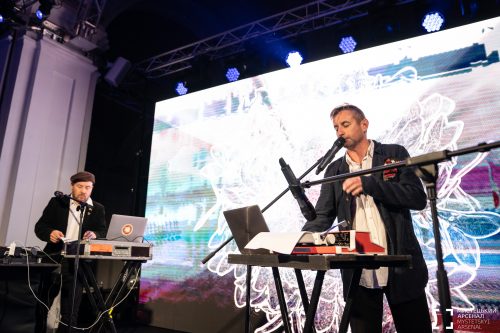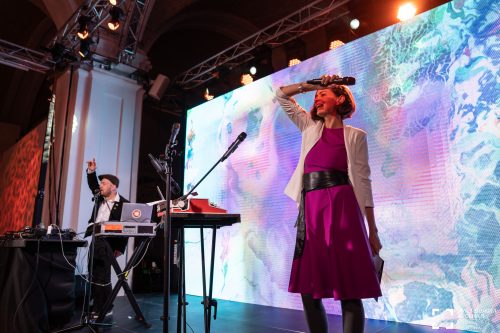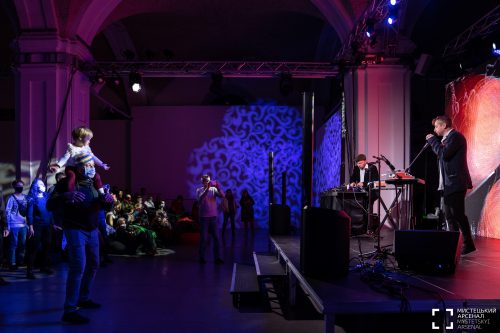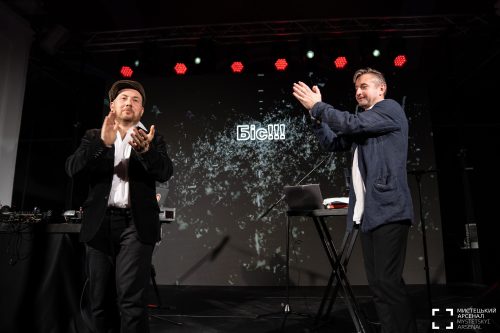Fokstroty
Fokstroty is an experimental side-project of the Literary Laboratory of the Mystetskyi Arsenal within the project on Ukrainian futurism, FUTUROMARENNIA. The Fokstroty project is curated by Oksana Shchur.
The project has two components: the Fokstroty album, and the Fokstroty musical and poetic performance on stage.
The Fokstroty album consists of 11 tracks and animations that are now freely available on the YouTube channel of the Mystetskyi Arsenal. The texts and phonograms of recordings used here are by Mykola Bazhan, Mykhail Semenko, Geo Shkurupii, Pavlo Tychyna, Oleksa Vlyzko, Filippo Tommaso Marinetti, Volodymyr Sosiura, Raisa Troianker, Natalia Uzhvii, Leonid Pervomaiskyi, Serhiy Zhadan and others.
The album premiered on October 28, 2021 in the Mystetskyi Arsenal during the Fokstroty musical and poetic performance (performed by Yuriy Gurzhy, Serhiy Zhadan, and Lyuba Yakimchuk).
 |
 |
 |
 |
Photo: Oleksandr Popenko © Mystetskyi Arsenal
Participants of the project:
Composer and music producer: Yuriy Gurzhy
Script: Serhiy Zhadan, Yuriy Gurzhy
Project curator and producer: Oksana Shchur
Yuriy Gurzhy — keyboards, guitars, bass, beats, audio arrangements, vocals
Serhiy Zhadan — vocals
Eugene Manko (La Horsa Bianca) — saxophone (tracks: Bazhan. Intro; Sosiura. Dub Chanson)
Lyuba Yakimchuk — vocals (tracks: Semenko. Hello; Troianker. Tiger Lilies; Bazhan. Never (again!))
Grigory Semenchuk — vocals (track Bazhan. Never (again!))
Semenko Children’s Choir (tracks: Bazhan. Intro; Bazhan. Disneyland; Tychyna. Clarinets; Vlyzko. Fire):
(conducted by Halyna Pechenizhska):
Polina Pechenizhska
Sofia Pydko
Anhelina Stadnyk
Maria Fomina
Yelizaveta Kyseliova
Diana Martsynkovska — vocals (tracks: Sosiura. Dub Chanson; Troianker. Tiger Lilies)
Marichka Litynska — vocals (track Troianker. Tiger Lilies)
Terra Studio — vocals recording
Shpytal Records — mix & master
Grycja Rd — collages
Eugene Arlov (Photinus studio) — video animation
© PE NACMC Mystetskyi Arsenal
What is this project about?
Serhiy Zhadan, participant of the project:
“It is surprising that sometimes we don't notice how poetry that is called classical, textbook poetry, is in fact contemporary and alive. We had great poets, they wrote plastic and musical lyrics that you want to sing and recite. That’s what we are actually doing.”Yuriy Gurzhy, participant of the project:
“How would Ukrainian pop music sound if poets who lived 100 years ago joined in its creation? Would Pavlo Tychyna be inspired by modern disco sounds? What would have happened if Serge Gainsbourg (whose parents were born in Kharkiv and Odesa, by the way) recorded erotique pop inspired by Raisa Troianker's poems? And what would Lee Scratch Perry’s reggae sound like if he'd used Volodymyr Sosiura's lyrics?
Our Fokstroty project is an attempt to answer all these questions.”
Oksana Shchur, curator of the project:
"In the past, we used to make mockery of old poets, and now their best poems become islands of nostalgia in the ocean of irony. You can “break through into the radioether of death” by arranging a disco party together with them. Fokstroty is a disco for a wide range of people, for you and me, for culture workers, for teachers and students.”
More about the tracks in the Fokstroty album:
1
Bazhan. Intro
The sound of the stairs creaking in the Slovo House for Writers (Kharkiv, Ukraine, built in 1930 as housing for professional writers; most of the first residents were later subjected to repressions). On the air we hear Mykola (Nick) Bazhan (1904-1983), one of the most prominent Ukrainian poets of the 20th century. A recording of his voice can be heard first, with the refrain about Melodies of the Space Age. And then, from Kharkiv in the 2020s, comes Serhiy Zhadan (b. 1974) who reads a poem by Bazhan about the sensuality of the foxtrot.
2
Bazhan. Disneyland
The founder of Italian futurism, writer Marinetti (1876-1944) functions as a human beatbox alongside vocals by Serhiy Zhadan, a rock star of contemporary Ukrainian poetry. The text is by Nick Bazhan, a futurist of 1920s Kharkiv: “Spin, world, spin, circus, spin, o carousel! And a sharp-edged firework flies up above it all…”
3
Tychyna. Clarinets
“And I watched, and I springtimed: The planets harmonized. Forever I learned that You are not Wrath, but rather Clarinets of the Sun.” These lines describe streams of coloured light pouring through church stained glass windows.
This poem by the impressionist poet Pavlo Tychyna (1891–1967), familiar to every Ukrainian schoolchild, is given a jaunty electro-pop overhaul here.
The role of Tychyna is played by Ukrainian actor Oleksandr Hai (1914–2000); the role of the typewriter — by a typewriter from the Kharkiv Literary Museum.
4
Vlyzko. Fire
“Fire, fire! — I long for superhuman love! Let the blood boil in the breasts of the young! I take thee, O my thorny world, Into the embrace of the sun!” Oleksa Vlyzko (1908–1934) lost his hearing at the age of 13; at 19, he published his first volume of poetry; at 26, he was sentenced to death by the Soviet authorities. His short literary path was full of experiments: in classicism, futurism, agit-poetry. In his work, he was active, ironic, and full of solid and sublime pathos.
At the beginning we can hear the voice of Leonid Pervomaiskyi (1908–1973), a Jewish poet and front-line radio correspondent during World War II; the connection between these two is not obvious, except for the fact that for a short time their paths crossed in the same time and space.
5
Hariaiv. Danse macabre
The last futurist poet in Kharkiv, Volodymyr Hariaiv (1914–1997) managed to pass the torch, and his memoirs, to young poets of the 1990s, including Serhiy Zhadan. His presence in this album bridges the gap between the “Executed Renaissance” (as the repressed generation of the 1920s/1930s is often known) and the present day.
6
Shkurupii. Drums
Can you hear someone dialing a rotary phone? “The King of futuroprairies”, the panfuturist Geo Shkurupii (1903-1937), is answering the call with his love lyrics: “When your eyes are under me, your breasts and your body… The drum of sorrow is beating, my worldly heart… Even now, being so close, you cannot understand the drummer, when the stars are drawing a line, and find death in the ether.”
7
Semenko. Hello
“Take, take my breath, Use my energy for the new world. My Body is for destruction, My Spirit is a hello to the unknown.” Ukrainian literature’s major futurist, Mykhail Semenko (1892–1937) says “Hello” to his co-residents at the Slovo House. Hello, says his wife Natalia Uzhvii (1898-1986). Hello, says Volodymyr Sosiura. Salām, adds Nick Bazhan. Hello, echo Serhiy Zhadan and Lyuba Yakimchuk from the 21st century.
8
Sosiura. Dub Chanson
The master of love lyrics Volodymyr Sosiura (1897–1965), who is also the author of the canonical poem “Love Ukraine”, sings a chanson over a dub beat. Then Serhiy Zhadan picks up his lines: “I will go walking down the streets, where cars are speeding and white smoke is melting, where drunken prostitutes are passing by and shouting hoarsely.”
9
Troianker. Tiger Lilies
Raisa Troianker (1909–1945), a poet from avant-garde circles, came to Ukrainian literature from a Jewish shtetl. She is said to have left a traveling circus, where she worked as a tiger tamer, because of an affair with Volodymyr Sosiura. Here they are singing a duet.
10
Zhadan. Dead Poets
The final composition of the album begins with a poem by Mykhail Semenko about Mykhail Semenko in the rhythm of incantation. Then there is an early poem by Serhiy Zhadan, the co-author of this album: “Of all the literature and all the possibilities of language, I personally have always been interested in words used to address the dead. As though you could really make sentences that can break through into the radioether of death.”
11
PS. Bazhan. Never (again!)
Mykola Bazhan's propaganda poem (1942) is still broadcast on Ukrainian Radio every year on May 9th. On the occasion of Putin's proclamation of the denazification and demilitarization of Ukraine, the voice of the Soviet poet now sounds like a weapon aimed in the other direction. The rapper Hryts Semenchuk (BRAT) has added some anti-pathos by inviting Russian invaders to the infernal festival of the recently deceased Russian singer Iosif Kobzon, infamous performer of the anthem of the USSR and of Novorossia.
The tracks of the Fokstroty album include recordings of the voices of Ukrainian poets which you can also hear in the program "Poetry on Radio Culture", a partner of this project. The songs also include the sounds of typewriters and other items belonging to the residents of the Slovo House from the funds of the Kharkiv Literary Museum. We are grateful to Radio Culture and the Slovo Kharkiv Literary Residence for their cooperation on the project.
Бажан. Інтро
Дугою вигнувшись, дає струна тупа,
Немов краплині, впасти чорній ноті,
І ось улесливо з оркестру накрапа
Мелодія в розбещеній скорботі.
І люди йдуть, згинаючись в фокстроті,
Ламаючись у нерухомім па.
Підноситься зневажливо рука,
І щерблене перо, неначе шпага, гнеться,
І пада зломлений, в покресленій чернетці
Рядок, мов щогла неструнка.
Та напина вітрила плавні строф,
Скрипить холодним тросом літер
Вітер
Вишуканих катастроф.
Бажан. Діснейленд
Крутися, світ, крутися, цирк,
крутися, карусель!
І гостроверхий фейєрверк
злітає над усе…
Із чорного стебла баска
сівба важких басів,
і флейти метушня баска
на рині голосів.
Різкий плижок, зухвалий скік,
сухий, як дріб, галоп,
і флейт одчай, цих флейт баских
над ямами синкоп.
Крутися, світ, крутися, цирк,
крутися, карусель!
І гостроверхий фейєрверк
злітає над усе…
І день — у смерк, і ніч — у смерк,
і серце — нічичирк.
Крутись, скажений фейєрверк,
Крутись, скажений цирк!
І око юрб проколоте
на шпагах тисяч ламп.
Крутись, прокляте коло те…
Крутись, прокляте коло те…
Крутися, світ, крутися, цирк,
крутися, карусель!
І гостроверхий фейєрверк
злітає над усе…
Тичина. Кларнети
Не Зевс, не Пан, не Голуб-Дух,
Лиш Сонячні Кларнети.
У танці я, ритмічний рух,
В безсмертнім — всі планети.
Я був — не Я. Лиш мрія, сон.
Навколо — дзвонні згуки,
І пітьми творчої хітон,
І благовісні руки.
Прокинувсь я — і я вже Ти:
Над мною, підо мною
Горять світи, біжать світи
Музичною рікою.
І стежив я, і я веснів:
Акордились планети.
Навік я взнав, що Ти не Гнів, —
Лиш Сонячні Кларнети.
Влизько. Вогню
Вогню, вогню! — Надлюдської любові!
Хай кров кипить у грудях молодих!
Беру тебе, о, світе мій терновий,
В обійми сонячні!
Як теплий птах
І птах вогненний, облітаю серцем
По всіх світах, — над людом простягаю
Безмежні крила. — Хай приходять всі
Під їх покрови. — Як не знайдуть раю,
То знайдуть пекло молодих обіймів,
Вселюдських, сильних, що під ними злоба
Згорить на попіл, — і звіряче серце…
Хай кров кипить у грудях молодих!
Хай кров кипить!
Вогню, вогню! — Надлюдського буяння!
Любові нової, без слів, побитих
Устами євнухів, устами серць,
В перчатках вкладених, — щоб не побачив хто,
Який там льох вонючий і отруйний.
Із хробаками й червами — шляхетним брудом,
Що берегли нащадки рахітичні
Дегенератів з “голубою кров’ю”, —
З гербами пишними, “красою дому”,
Та гниллю ран під золотим плащем!..
Хай кров кипить у грудях молодих!
Хай кров кипить!
Вогню, вогню! — Надлюдської любові! —
Живої — сильним, мертвої — зогнилим.
Любові буйної, гарячої (вогню!), —
Усіх речей любові чарівної,
Щоб враз любити землю, звіра, люд,
І жити сонцем, тільки сонцем жити,
Та власним потом здобувати щастя;
Своїм синам, онукам і нащадкам
Далеких днів!..
Вогню, вогню, — любові!
Хай кров кипить у грудях молодих!
Хай кров кипить у грудях молодих!
Хай кров кипить!
Гаряїв. Данс макабр
Тане у тінях палата. Танцює
Сніг за вікном, наче гристе вино.
Снігом засипле, без сумніву, всує,
Мов сум фортеп’яно в німому кіно.
Снігом заступить, втамує туманом –
Смерть це ж і є небуттєвий туман.
Ні, це не омана. Їй так притаманно:
Змінювать стан, завше змінювать стан.
Смерті танок – вічна перебудова
Стану клітин, перетворення їх
Знову і знову на першооснову –
Й не перелічиш їх, й не розрізниш.
не осягнеш, чи то знову завзято
Б’ються сніжини в темне вікно,
Чи то ведуть електрони круг ядер
Той невтамований смерті танок.
Шкурупій. Барабани
Очі твої підо мною,
перса
і тіло твоє…
Руки в траві розкинуті,
вогкі долоні
в долонях моїх.
Очі твої свічада,
і я величезний,
безумний
ніжно вдивляюся в них.
Тіні пахучого вечора,
вогні недалекого міста,
чорний, тихий кажан,
що поринає в присмерк…
Тиша.
Задумливість.
Пахне земля,
пахнемо ми…
Близько, близько обличчя.
Ти бачиш, як падають зорі,
неба сліпучі дарунки.
Я ніжно торкаюся рани
запашних і вабливих вуст.
Поцілунок.
Чуєш?
Б’є барабан.
Навіть тепер,
як близько…
Коли очі твої підо мною,
перса
і тіло твоє…
Б’є барабан печалі,
серце моє світове…
Навіть тепер,
так близько,
ти не можеш збагнуть барабанщика,
коли зорі накреслюють риску,
знаходять в етері смерть.
Він барабанить про світову печаль,
за ясність твоїх очей…
Ти не можеш збагнуть барабанщика,
ти здивуєшся,
коли він не візьме тебе.
Бий,
бий,
одбивай похоронні такти,
барабане печалі!
Стукай, серце,
про скорий кінець!
Оплесків не буде
засміяному барабанщику,
велетенському барабанові
всіх сердець.
Семенко. Хелло
Розірвіть моє серце, випустіть кров,
Заберіть усю прану.
Борсаєсь в грудях мій бентежний Бетховен
Цілу ніч до рана.
Візьміть, візьміть моє диханнє,
Енергію вжийте на новий світ.
Тіло моє — для руйнування,
Дух — невідомому привіт.
Сьогодні вдень мені було так нудно,
Ніби докупи зійшлись Олесь,
Вороний і Чупринка.
Почувалося дощово і по-осінньому облудно –
В душі цілий день
парикмахер на гітарі бринькав.
Іноді думав про неї й робив ескізи листа –
Що не гадався їй надісланим бути.
Згадав кілька французьких фраз забутих,
Разів зо два поглянув на образ Христа.
Наспівував банальні вальси безголосно,
Дивлячись на стелю в брудне павутиння.
Ні, мені було тільки тоскно – тільки тоскно…
В серці моєму розкладалась диня.
Багнеться бути
Кондуктором на товаровому потязі
В похмуру ніч
Темну ніч
Осінню дощову
Сидіти на тормозі
У кожусі
Зігнувшись і скупчившись
Дивитись у прірву рухливу.
Про дні що минули
Що в серці зосталися
Ясними плямами
Про образи згадні
Заснулі у грудях навіки
Навіки
Мріять
Мріять
Вдивляючись в сутінь.
Сосюра. Даб шансон
Такий я ніжний, такий тривожний,
моя осінняя земля!
Навколо вітер непереможний
реве й гуля…
І хвилі моря, далекі й близькі,
мені шумлять.
Там стеле сонце останнім блиском
кривавий шлях…
Криваві пальці тремтять… О, зоре,
постій, не йди!
Але шумує далеке море
і мла… і дим…
Такий я ніжний, такий тривожний,
моя осіння земля!
Навколо вітер непереможний
реве й гуля…
+
Я піду на вулиці, де прудко
мчать авто і тане білий дим,
де гуляють п’яні проститутки
й закликають голосом хрипким.
Скільки лиць, одеж, очей і рухів!
У очах мереживо цвіте…
Хтось здійняв до неба жовті руки
й проклинає місто золоте…
Троянкер. Тайгер ліліес
Пам’ятаєш місто маленьке
на далекій, глухій провінції,
де не чути трамвайного дзенькоту,
де любов переллята за вінця.
Пам’ятаєш —маленький цирк
і мене – укротительку звірів.
Не забути хвилин цих,
невимовно болючих і щирих…
Пам’ятаєш – притих партер,
(за першим дзвоником другий)
Й ти об ноги мої тер
Шкіри своєї смуги.
Пригадай золоті сни,
Мій німий, смугастий любовнику,
Пригадай після виступу ніч,
Таку страшну й молитовну.
Я у клітці. Тиша густа.
Лапа твоя на моє стегно.
(там і зараз, біля живота
Хрестик, синьо-таємний).
Пам’ятаєш у цирку була
Молода й запальна тигриця.
Я її укротить не змогла —
І пішла, бо коритись – не личить.
Пам’ятаєш – виступ останній
І анонси – “новий укротитель”.
Ти відчув те прилюдне прощання
І дивився очима розбитими.
Грав Джордані, як завжди, тустеп
І од музики злий і напругий
Ти об мене з розпукою тер
Шкіри своєї смуги.
Я забула далеке місто
І малесенький цирк на провінції.
Але в пам’яті ти кігтистий, —
І любов переллята за вінця.
Велике місто. І в зоосаді мужчина
коханий сказав —”Глянь, он красивий тигр” —
І так розпачливо, і так тьмяно
Я закричала: “Ти!”
Ти впізнав і твої вуста,
(Я відчула, мій Зеро, я знаю),
Як останнього вечора, так
Тричі сказали – “Рай-я”.
То була золота гроза,
Нині складаю вірші я.
Директор зоосаду писав: —
“Тигр хворий. Здоров’я гіршає”.
Жадан. Мертві поети
Хайль семе нкоми
Ихайль кохайль альсе комих
Ихай месен михсе охай
Мх йль кмс мнк мих мих
Семенко енко нко михайль
Семенко мих михайльсе менко
О семенко михайль!
О михайль семенко!
З усієї літератури
й усіх можливостей мови
особисто мене завжди цікавили слова,
якими звертаються
до померлих.
Ніби справді можна скласти речення,
здатні пробитися в радіоефір смерті.
Послухайте мене,
ви – позбавлені солодких рецепторів співу.
Послухайте мене тепер,
розчуйте мій шепіт,
спотворений акустикою небуття.
Послухайте мене,
ви – мічені за життя діалектами, ніби шрамами,
ви – в чиє горло з дитинства входила розжарена голка абетки,
ви – хористи, що вміли відтворювати пташиний крик.
Я ж знаю – найбільшою несправедливістю
для вас нині є неможливість відповісти на голоси,
які викликають вас із туману,
неможливість сказати бодай щось на своє виправдання,
неможливість захистити цей нічийний нічний простір
між сподіванням і пам’яттю.
Але навіть по смерті мова є важливою.
Подібна до поглиблення річища,
схожа на перше осіннє прогрівання
великого дому.
Єдине правило – закорінюватись
і пробиватись.
Єдиний шанс – триматись за гілку голосу.
Поза тим не буде нічого.
Ніхто не запам’ятає тебе за твоїм мовчанням.
Ніхто за тебе не дасть імена довколишнім річкам.
Ви – що складаєтесь нині з відлуння,
ви – нині виповнені тишею,
говоріть, ну ж бо, говоріть,
говоріть травою,
говоріть памороззю,
говоріть диригентами.
PS. Бажан. Невер (еґейн!)
В нас клятва єдина і воля єдина,
Єдиний в нас клич і порив:
Ніколи, ніколи не буде Вкраїна
Рабою фашистських катів!
Ми сталлю з гармати, вогнем з карабіна
Розтрощимо вщент ворогів.
Ніколи, ніколи не буде Вкраїна
Рабою фашистських катів!
Ворогів нам всіх не жаль
В пеклі їх чека медаль.
Щоб розвіяти печаль —
Там Кобзона фестиваль.